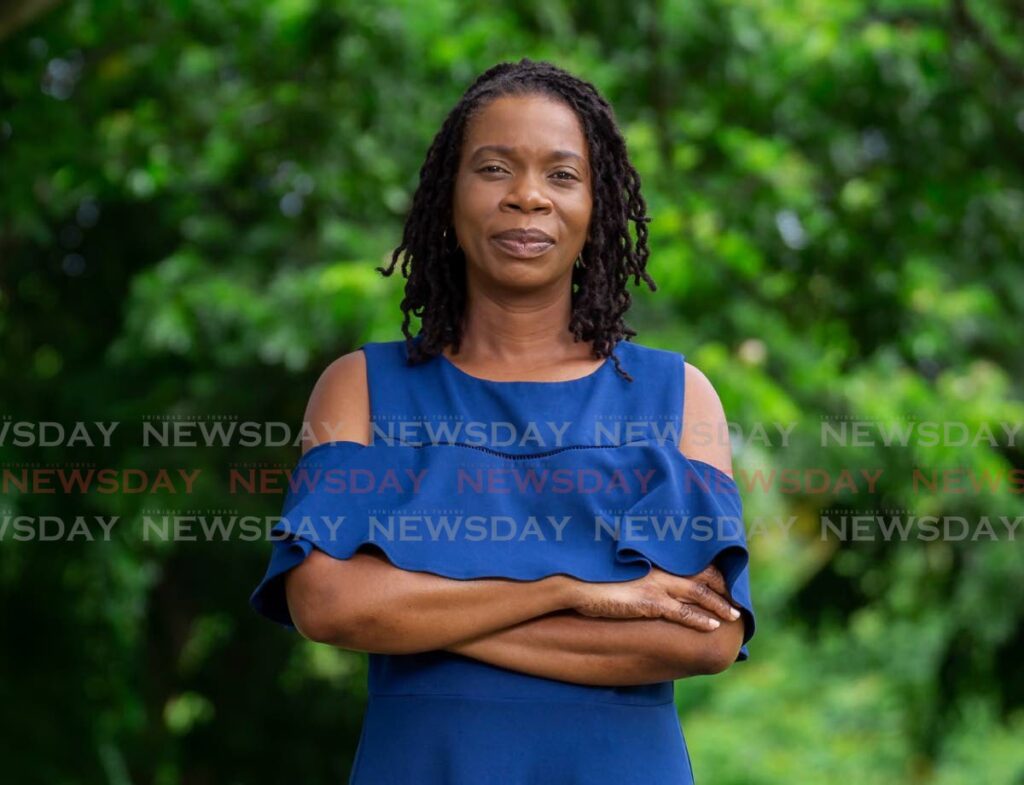Billie Lewis wants better care for substance misusers

IN the ten years she has served as manager of the Alcohol and Drug Prevention Programme (ADAPP) of the THA Division of Health, Wellness and Social Protection, Billie Sterling Lewis has tried to not only help her clients regain wholesome lives but to change society’s perception of them.
She’s had many success stories of clients who’ve beaten the odds and led meaningful, productive lives but changing people’s mindset about substance misusers and the pain they often undergo remains an uphill battle.
“Society tends to treat misusers with disdain, fear and hostility,” Sterling Lewis told WMN.
Substance misuse is the use of alcohol, illegal drugs, or over-the-counter or prescription medications in a way that they are not meant to be used and could be harmful to you or others around you. People can misuse substances one time, occasionally, or regularly, and they can go on to develop substance use disorder.
According to the Cystic Fibrosis Foundation substance misuse is "the use of alcohol, illegal drugs, or over-the-counter or prescription medications in a way that they are not meant to be used and could be harmful to you or others around you. People can misuse substances one time, occasionally, or regularly, and they can go on to develop substance use disorder."
As a result, Sterling Lewis said many people with substance misuse disorders also have comorbid mental health disorders like depression (uni and bipolar), psychotic and personality disorders, which tend to increase the fear factor.
She said in her experience, substance misusers are also abused physically, mentally and emotionally. This is especially so with female drug misusers, who have a more difficult experience as users and in seeking help, recovery and healing, she said.
“That is a whole other issue by itself.”
Sterling Lewis said while people in society have tried to assist substance misusers, many of them lack the patience, knowledge and understanding of the condition, thus creating more harm than good. She said substance misusers are often viewed as moral failures and blamed for their condition while others are seen as violent people who should be locked away from the society.
While some believe that misusers can never recover and regard relapses as evidence of the same, Sterling Lewis said this is not the case.

- DAVID REID
She noted there is also the belief that some people choose drugs because they are evil, disobedient, stupid and weak.
“But the truth is that most persons dealing with substance misuse disorders started using to self-medicate and cope. It is usually a symptom of a bigger and deeper issue. And yes, while it was a choice that they made, many didn’t feel like they had other viable options.”
As she bids Tobago farewell, Sterling Lewis is hoping that the programmes that were implemented over the years to treat with substance misusers will be expanded to meet the challenge both internally and externally.
From the research and anecdotal evidence currently available, she said, the problem of substance misuse in Tobago is significant.
“The decriminalisation of marijuana has served to add another dimension to an already serious problem.”
Sterling Lewis, who was presented with a token recently for her contribution to the development of the ADAPP, said adolescent substance use is also a serious problem on the island.
“While most adolescents do not misuse substances, the fallout from those who do, is many times more significant, thus making it a significant challenge.”
For the Antiguan-born psychologist, who assumed the position of ADAPP manager on April 16, 2012, demand reduction programmes are vital to the health and wellness of any society.
Describing substance misuse and its resulting disorders as a public health issue, Sterling Lewis said many non-communicable diseases are triggered by substance abuse.
Social problems, like domestic abuse, motor vehicular accidents, employee absenteeism and low productivity result from, or have indicated in them, substance misuse, she noted.
“Therefore, such programmes must be available and be done well, as they can help to mitigate morbidity and mortality. Having the information consistently in the public, serves to educate and reinforce the message that can lead to better choices.”
Drug prevention education, Sterling Lewis noted, is not just about drugs and its effects but life skills and building protective factors.
“Programmes like these must be continually operated from the earliest possible level, in order to have the greatest impact.”
Sterling Lewis said rehabilitation programmes, which she described as “symbols of hope,” offer accessible, quality service. “Most persons would think it crazy for a country to exist without a hospital. I think it’s ludicrous for a country to exist without a functional substance misuse rehabilitation programme. It is a part of sustainable healthcare.”
Growing up the eastern village of Bethesda, the last of three children, Sterling Lewis said she has always been interested in helping people.
She described herself as a “bonafide country girl with a global view,” but said she and her siblings were raised differently to most children. They didn’t have a television as her father, a pastor and farmer, was not very fond of it. But they had a “literal house of books” in the family’s yard.
Her mother was and still is an ECCE educator and agriculturalist.
“So I grew up on lots of land, ate what we grew, travelled a lot and participated fully in church life. I was always a sensitive soul, love animals, people and the things of God. I always wanted to help people, so from an early age I knew what I wanted to be a psychologist or a doctor.”

Although her father wanted her to become a lawyer, Sterling Lewis settled on psychology. She did her bachelor’s and master’s degrees at the University of the West Indies’ Cave Hill campus in Barbados.
The mother of four also holds a certificate in Change Leadership from Cornell University, a post-graduate diploma from UWI’s Mona, Jamaica, campus and an MBA from the University of Bedfordshire, United Kingdom.
Once an avid 4-H’er, she said the volunteer work she did from the age of 15 at the welfare department in the government service, primarily in summer camps, provided a solid base for the experiences she encountered throughout her career.
But after her first degree, she initially worked as a feature writer for a local weekly newspaper and then as a social worker in the same welfare department she volunteered in as a teenager.
Sterling Lewis then entered the education sector as a school counsellor and some years later, was introduced to substance misuse. Over the years, she has also lectured at tertiary level and started several businesses.
She admitted that her working experience in Tobago has not been “a bed of roses” in many instances “but I am grateful for the victories, the lessons and the growth."
“The opportunities gained there, the ability to impact and influence various populations go down in my memory as most meaningful and memorable.”
Sterling Lewis said many of the challenges she faced were linked to a “gross misunderstanding” about substance abuse and substance misuse disorders.
Not committing sufficient resources to the work of demand reduction from a governmental and non-governmental standpoint was also a major issue.
Sterling Lewis said the paucity of a solid cadre of trained and experienced workers in the field also served as a challenge. Greater still was the high levels of what she called “divisiveness” in the field.
“People sometimes prefer not to collaborate and it often appears more competitive than complimentary. This I found challenged the effectiveness and efficiency of the work.”
So too did stigma and discrimination.
“This I have seen at all levels.”
On the flip side, she regards the opening of Tobago’s first drug rehabilitation programme as one of the high points of her position as manager.
The hosting of a Drug Awareness Week and the introduction of the preschool drug prevention education programme, Trinity SMART, were also among her highlights.
On a more personal level, Sterling Lewis said having interns and July-August vacation workers experience and understand the value of substance misuse “has always been a point of celebration for me.”
The outgoing ADAPP manager said she had no regrets about her tenure.
“I am satisfied that I have done my best; my utmost best, with what I was given to work. I cannot say I have regrets with the work I did.”
But in order to improve the system, she said, there must be proper and thorough dialogue with substance misuse agencies before, during and after the framing and passing of legislation.
Sterling Lewis said government-run and funded programmes must also be given adequate resources by way of finances and personnel so they can adequately fulfill their mandate.
“It is time for the THA to have a workplace drug policy that is passed into law or put into effect and there needs to be better collaboration with NGOs, FBOs and CBOs, who are actively working in the field.”
She added scholarships can also be offered for people to pursue specialised studies outside of diplomas and full degree programmes.
Referring specifically to Tobago, Sterling Lewis said while the Government does its part, entrepreneurs and the community also have a major part to play.
As for her experience of living and working on the island, she said Tobago has become her home in many ways.
“A significant part of my personal growth and maturity so far has taken place here. My four children were born in the Republic (two in Tobago and the others in Trinidad), so it is home.”
She said leaving is bitter sweet.
“I believe in the frailty of time, so I am grateful to have used most of the time here to fulfill my purpose to the best of my abilities. Like I’ve been saying, Tobago is only a plane ride away.”


Comments
"Billie Lewis wants better care for substance misusers"